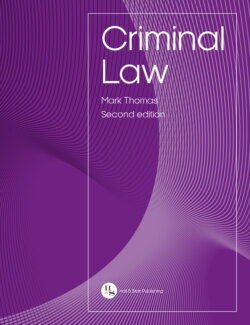Читать книгу Criminal Law - Mark Thomas - Страница 68
На сайте Литреса книга снята с продажи.
2.4.1.2Involuntary conduct
ОглавлениеInvoluntary conduct, on the other hand, can best be understood not as anything done by the defendant, but rather as something that happens to the defendant. If a person has acted involuntarily, he is generally not guilty of an offence. Horder (Ashworth’s Principles of Criminal Law, 9th edn (OUP, 2019)) usefully summarises this principle by stating that, ‘It is not merely a denial of fault … It is more a denial of authorship.’
example
Jill dared Jack to jump from the window; however, he was too scared to do so. Jill then pushed Jack from the window, and Jack fell on top of the car, damaging the windscreen.
In this example, Jack has been physically compelled by Jill, and his conduct is involuntary given that he had no control over his actions. In such a case, Jack will not be liable for criminal damage but Jill may be.
case example
Charge: Murder
Case progression: Crown Court – Guilty
Northern Ireland Court of Criminal Appeal – Conviction upheld
House of Lords – Conviction upheld
Point of law: Defences of insanity and automatism
In Bratty v AG for Northern Ireland [1963] AC 386, the defendant strangled a woman whilst giving her a lift in his car and claimed that at the time of the incident he was not conscious of his actions.
The House of Lords was confronted with the question as to whether a defendant could raise the defence of automatism (where the body acts without control from the mind) to a case of murder. The decision focuses on the distinction between insanity and automatism, a matter we shall return to in Chapter 7; however, for present purposes, it is useful to cite the comment made by Lord Denning in relation to voluntary conduct. In particular, his Lordship stated:
The requirement that [the act of the accused] should be a voluntary act is essential … in every criminal case. No act is punishable if it is done involuntarily.
The most cited example of involuntary conduct is that given by Lord Goddard CJ and Pearson J in Hill v Baxter [1958] 1 QB 277. Their Lordships gave the example (and it was only an example despite the belief of many that Hill v Baxter actually concerned a case involving a swarm of bees) of a man charged with dangerous driving. His driving would be involuntary if he was suddenly stung by a swarm of bees. Under these circumstances, their Lordships held that the actus reus of the offence would not be voluntary given that the defendant would be acting in a state of ‘automatism’ (see Chapter 7) and thus would not be liable for dangerous driving.
Generally, therefore, involuntary conduct will not result in a criminal offence being committed. Note, however, that there are circumstances, known as cases of ‘situational liability’, where voluntary/involuntary conduct on the part of the defendant is irrelevant. This is dealt with at 2.5.
